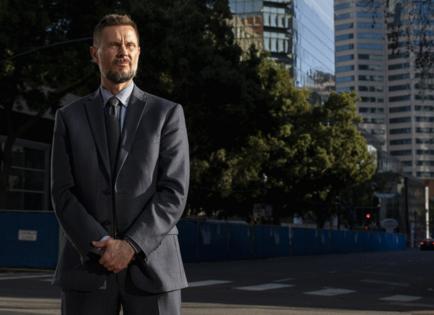Five years after voter approval, San Diego's police oversight body still lacks investigative power
Published in News & Features
SAN DIEGO — Nearly five years after San Diego voters overwhelmingly approved a ballot measure to strengthen police oversight, the city’s Commission on Police Practices still lacks the authority to conduct independent investigations into officer misconduct.
Despite having three investigators on staff, the commission has been operating under interim rules that limit it to reviewing the police Department’s internal affairs investigations and issuing policy recommendations.
The delay is due to a state-mandated “meet and confer” process, which requires the city to negotiate with employee unions over any proposed changes that might affect working conditions.
Bart Miesfeld, who’s currently serving as the commission’s interim executive director and its legal counsel, said he’s “optimistically hopeful” that discussions with two unions — the Municipal Employees Association and the Deputy City Attorneys Association — could wrap up in the next few months.
But discussions with the San Diego Police Officers Association, whose employees would be most affected by the commission’s expanded role, could stretch longer.
“I do not expect it to be a quick process,” Miesfeld said.
The lag in getting the commission up and running has become a point of frustration for police accountability advocates and commissioners.
“We receive a lot of pushback,” CPP Chair Ada Rodriguez said. “For example, if we ask for certain reports, sometimes (the police department is) not sure if they can share certain documents with us because meet and confer isn’t finalized. That hinders our capabilities quite a bit.”
It took more than two years for the city to draft and adopt the ordinance that created the CPP and defined its powers — a process slowed in part by disagreements over who would be eligible to sit on the commission.
The City Council didn’t appoint the first slate of commissioners until mid-2023, and the CPP’s proposed operating procedures weren’t finalized until this year.
Although the police union remained neutral on Measure B — the 2020 ballot measure that promised an independent oversight board with subpoena power and investigatory authority — it later objected to a proposed ban on family members of law enforcement serving on the board and asked that officers receive advance notice before the CPP could release certain records under the California Public Records Act.
After months of meetings, in October 2022, negotiations stalled, forcing the City Council to declare an impasse so the CPP’s implementation could move forward.
During public comment before the council voted on the impasse, police union President Sgt. Jared Wilson described the CPP as being part of a “radical, abolish-the-police agenda” and blamed it for officers leaving for jobs in other cities.
“Our cops are better off somewhere else,” he said.
Earlier this week, Wilson offered a more measured tone, telling the Union-Tribune that the union is “working with the city to move this forward in a timely fashion.”
He did not respond to questions about his past criticisms.
The start of the meet and confer process was delayed after the CPP’s executive director, Paul Parker, and general counsel, Duane Bennett, both resigned in December.
Parker, who previously led the county’s Citizens Law Enforcement Review Board, warned in his Jan. 3 exit memo that it could be a few years before the CPP was functioning as intended.
Parker told the Union-Tribune that he based that estimate on his experience working with the union representing San Diego County sheriff’s deputies.
Barbara Attard, a police accountability expert, said meet and confer can last months, but beyond a year is unreasonable.
“It’s meet and confer, not meet and agree,” she said. “They don’t have to agree on everything. They have to meet with them and confer, and then case closed, you move on.”
The commission’s executive director and legal counsel — roles Miesfeld is currently juggling — can participate in negotiations and report back to commissioners during the closed-session portion of CPP meetings.
In his exit memo, Bennett urged the commission to avoid micromanaging the negotiation process and instead focus on big-picture policy, public engagement and trust-building. He warned that trying to scrutinize every element of labor talks “could lead to unnecessary confusion and frustration.”
As negotiations start, the CPP is also launching a search for a new executive director. After Parker’s departure, Councilmember Marni von Wilpert, who chairs the City Council’s public safety committee, said she would not initiate a search until the CPP addressed issues raised by Parker and Bennett.
Parker alleged unclear leadership roles and underuse of staff expertise and recommended downsizing the commission from 25 to 13 members. Bennett echoed those concerns in his own memo, citing confusion over responsibilities and disregard for legal advice.
“I’m not going to … use the taxpayer dollars to do this until we figure out why people are resigning and why we’re not succeeding,” von Wilpert said in February.
In March, commissioners unanimously rejected the idea of cutting the CPP’s size but agreed to clarify leadership roles and establish a formal performance-evaluation process for the executive director.
Despite limitations, the commission has leaned into policy work. In 2024, it launched a policy committee and issued nine recommendations for updating the San Diego Police Department’s vehicle pursuit policy after multiple chases resulted in fatalities. The committee is currently examining pretext stops and use-of-force standards, Rodriguez, the commission’s chair, said.
“I can’t wait until we are fully implemented,” she said, “and doing what we signed up to do.”
_____
©2025 The San Diego Union-Tribune. Visit sandiegouniontribune.com. Distributed by Tribune Content Agency, LLC.







Comments